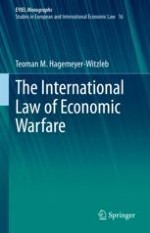2021 | OriginalPaper | Buchkapitel
6. Sector Non-Specific Economic Warfare
verfasst von : Teoman M. Hagemeyer-Witzleb
Erschienen in: The International Law of Economic Warfare
Aktivieren Sie unsere intelligente Suche, um passende Fachinhalte oder Patente zu finden.
Wählen Sie Textabschnitte aus um mit Künstlicher Intelligenz passenden Patente zu finden. powered by
Markieren Sie Textabschnitte, um KI-gestützt weitere passende Inhalte zu finden. powered by
